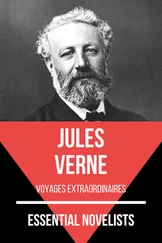Barbicane had made a great fortune as a timber-merchant; named director of artillery during the war, he showed himself fertile in inventions; enterprising in his ideas, he contributed powerfully to the progress of ballistics, gave an immense impetus to experimental researches.
He was a person of average height, having, by a rare exception in the Gun Club, all his limbs intact. His strongly-marked features seemed to be drawn by square and rule, and if it be true that in order to guess the instincts of a man one must look at his profile, Barbicane seen thus offered the most certain indications of energy, audacity, and sang-froid .
At that moment he remained motionless in his chair, mute, absorbed, with an inward look sheltered under his tall hat, a cylinder of black silk, which seems screwed down upon the skull of American men.
His colleagues talked noisily around him without disturbing him; they questioned one another, launched into the field of suppositions, examined their president, and tried, but in vain, to make out the x of his imperturbable physiognomy.
Just as eight o’clock struck from the fulminating clock of the large hall, Barbicane, as if moved by a spring, jumped up; a general silence ensued, and the orator, in a slightly emphatic tone, spoke as follows:—
“Brave colleagues,—It is some time since an unfruitful peace plunged the members of the Gun Club into deplorable inactivity. After a period of some years, so full of incidents, we have been obliged to abandon our works and stop short on the road of progress. I do not fear to proclaim aloud that any war which would put arms in our hands again would be welcome—”
“Yes, war!” cried impetuous J.T. Maston.
“Hear, hear!” was heard on every side.
“But war,” said Barbicane, “war is impossible under actual circumstances, and, whatever my honourable interrupter may hope, long years will elapse before our cannons thunder on a field of battle. We must, therefore, make up our minds to it, and seek in another order of ideas food for the activity by which we are devoured.”
The assembly felt that its president was coming to the delicate point; it redoubled its attention.
“A few months ago, my brave colleagues,” continued Barbicane, “I asked myself if, whilst still remaining in our speciality, we could not undertake some grand experiment worthy of the nineteenth century, and if the progress of ballistics would not allow us to execute it with success. I have therefore sought, worked, calculated, and the conviction has resulted from my studies that we must succeed in an enterprise that would seem impracticable in any other country. This project, elaborated at length, will form the subject of my communication; it is worthy of you, worthy of the Gun Club’s past history, and cannot fail to make a noise in the world!”
“Much noise?” cried a passionate artilleryman.
“Much noise in the true sense of the word,” answered Barbicane.
“Don’t interrupt!” repeated several voices.
“I therefore beg of you, my brave colleagues,” resumed the president, “to grant me all your attention.”
A shudder ran through the assembly. Barbicane, having with a rapid gesture firmly fixed his hat on his head, continued his speech in a calm tone:—
“There is not one of you, brave colleagues, who has not seen the moon, or, at least, heard of It. Do not be astonished if I wish to speak to you about the Queen of Night. It is, perhaps, our lot to be the Columbuses of this unknown world. Understand me, and second me as much as you can, I will lead you to its conquest, and its name shall be joined to those of the thirty-six States that form the grand country of the Union!”
“Hurrah for the moon!” cried the Gun Club with one voice.
“The moon has been much studied,” resumed Barbicane; “its mass, density, weight, volume, constitution, movements, distance, the part it plays in the solar world, are all perfectly determined; selenographic maps have been drawn with a perfection that equals, if it does not surpass, those of terrestrial maps; photography has given to our satellite proofs of incomparable beauty—in a word, all that the sciences of mathematics, astronomy, geology, and optics can teach is known about the moon; but until now no direct communication with it has ever been established.”
A violent movement of interest and surprise welcomed this sentence of the orator.
“Allow me,” he resumed, “to recall to you in few words how certain ardent minds, embarked upon imaginary journeys, pretended to have penetrated the secrets of our satellite. In the seventeenth century a certain David Fabricius boasted of having seen the inhabitants of the moon with his own eyes. In 1649 a Frenchman, Jean Baudoin, published his Journey to the Moon by Dominique Gonzales, Spanish Adventurer . At the same epoch Cyrano de Bergerac published the celebrated expedition that had so much success in France. Later on, another Frenchman (that nation took a great deal of notice of the moon), named Fontenelle, wrote his Plurality of Worlds , a masterpiece of his time; but science in its progress crushes even masterpieces! About 1835, a pamphlet, translated from the New York American , related that Sir John Herschel, sent to the Cape of Good Hope, there to make astronomical observations, had, by means of a telescope, perfected by interior lighting, brought the moon to within a distance of eighty yards. Then he distinctly perceived caverns in which lived hippopotami, green mountains with golden borders, sheep with ivory horns, white deer, and inhabitants with membraneous wings like those of bats. This treatise, the work of an American named Locke, had a very great success. But it was soon found out that it was a scientific mystification, and Frenchmen were the first to laugh at it.”
“Laugh at an American!” cried J.T. Maston; “but that’s a casus belli !”
“Be comforted, my worthy friend; before Frenchmen laughed they were completely taken in by our countryman. To terminate this rapid history, I may add that a certain Hans Pfaal, of Rotterdam, went up in a balloon filled with a gas made from azote, thirty-seven times lighter than hydrogen, and reached the moon after a journey of nineteen days. This journey, like the preceding attempts, was purely imaginary, but it was the work of a popular American writer of a strange and contemplative genius. I have named Edgar Poe!”
“Hurrah for Edgar Poe!” cried the assembly, electrified by the words of the president.
“I have now come to an end of these attempts which I may call purely literary, and quite insufficient to establish any serious communications with the Queen of Night. However, I ought to add that some practical minds tried to put themselves into serious communication with her. Some years ago a German mathematician proposed to send a commission of savants to the steppes of Siberia. There, on the vast plains, immense geometrical figures were to be traced by means of luminous reflectors; amongst others, the square of the hypothenuse, vulgarly called the ‘Ass’s Bridge.’ ‘Any intelligent being,’ said the mathematician, ‘ought to understand the scientific destination of that figure. The Selenites (inhabitants of the moon), if they exist, will answer by a similar figure, and, communication once established, it will be easy to create an alphabet that will allow us to hold converse with the inhabitants of the moon.’ Thus spoke the German mathematician, but his project was not put into execution, and until now no direct communication has existed between the earth and her satellite. But it was reserved to the practical genius of Americans to put itself into communication with the sidereal world. The means of doing so are simple, easy, certain, unfailing, and will make the subject of my proposition.”
Читать дальше












